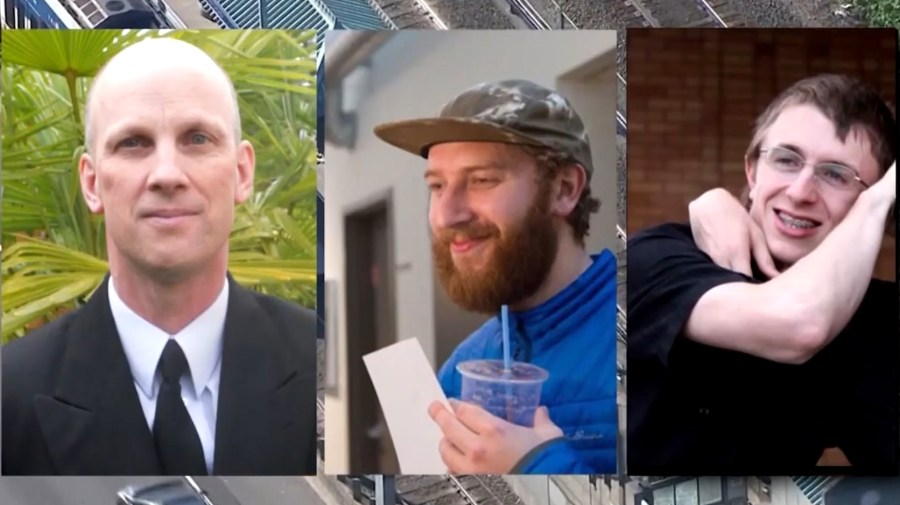PORTLAND, Ore. (KOIN) — What began as a MAX trip for two teens to the Clackamas Town Center turned violent and deadly on May 26, 2017. Now, 978 days after that attack, the man accused of killing two people and seriously wounding a third, Jeremy Christian, faced a jury to determine his fate in what’s become known as the MAX attack.
Those teens, Walia Mohamed and Destinee Mangum, took the stand and each cried while recounting the events and reliving that day after they got on a Green Line train for an after-school trip to the mall.
At first, they got on the Green Line going the wrong way, then hopped on a train going in the right direction.
Walia Mohamed, took the stand Tuesday afternoon to relate what happened as tears welled in her eyes. She spoke quietly in court, staring straight ahead for the most part, and occasionally dabbing away tears.
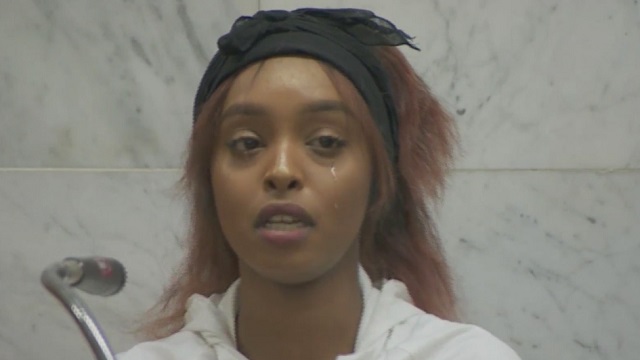
She said Christian (whom she mostly referred to as “the man”), was making racial slurs that she interpreted to be directed toward her.
When the prosecution asked what specifically Christian said, Mohamed asked if she was allowed to cuss and then answered, “F**k Muslims. Go back to Saudi Arabia. He was saying,” Mohamed paused, gasping and grabbing a tissue, “He said kill yourself.”
Mohamed, who immigrated to the US from Somalia, said she had never experienced racism directed at her before that day.
She described Micah Fletcher as “basically standing up for us” and telling Christian that they were just two young girls.
“Before it got physical, um, the man was saying, ‘Hit me, hit me,’” Mohamed said. She doesn’t remember who shoved first, but she said she saw Christian fall and then get up.
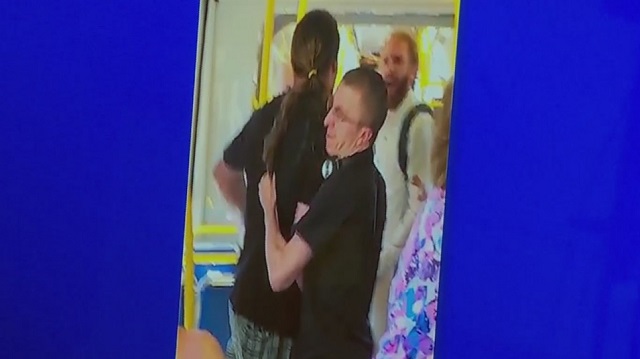
“I didn’t know he had a knife with him, so when he got up he just went off,” Mohamed said.
The prosecution asked when she realized there was a knife.
“When I saw Taliesin (Namkai-Meche) and he was holding his neck and we saw blood that’s when we realized he had a knife,” Walia testified.
Under cross-examination, she was asked if she specifically remembered Christian directing his comments toward her. Mohamed said no.
They also dug into the “racist comments” and asked Mohamed if they pertained to religion (Christians and Muslims) rather than race. She said yes.
Prosecutors got the final questions. They asked her about the PTSD the 20-year-old says she suffers from now.
She said it makes it difficult to remember specifics. But, “It’s like reliving it every day.”
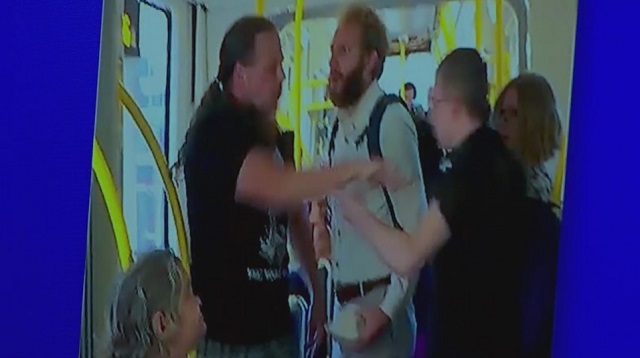
Destinee Mangum took the stand following Walia Mohamed. Near the beginning of her testimony, prosecutors shared terrifying videos she took the day of the attack.
One video included emojis before Mangum realized how serious the situation was becoming. In another video, people — including a man identified by prosecutors and defense as Christian — can be heard yelling.
Mangum can be heard screaming “Can I go home?” Then “Oh sh*t” over and over until it turns into pure screaming. The camera shakes and spasms, shows the ground, and then it stops.
After the video played, Mangum was visibly shaken.
“I was just scared because I’ve never experienced it before. I’ve always learned about it at school you know,” she said, referring to racism. But she said she had never been discriminated against before.
“He told us to die and that we don’t deserve to be here and that we should just go back to where we came from,” Mangum said.
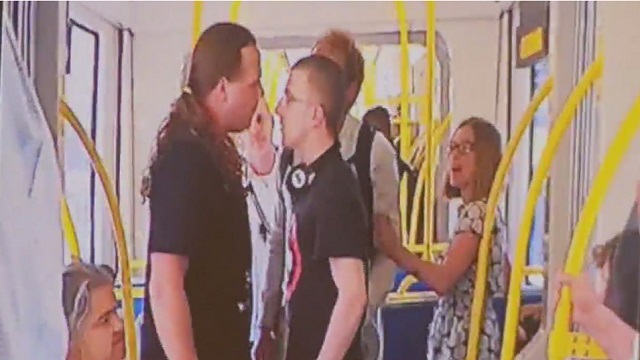
Mangum began crying as she explained how she was born and raised in Portland, so she didn’t understand why she was being told to go somewhere else.
The prosecution asked why she was screaming in the video. Mangum, sobbing, said, “Because I saw him stab Taliesin and I just saw him with his neck and there was blood through his fingers.”
She also detailed how the girls ran off the train.
“We could see him getting off the MAX and we turned around and we were like, oh my God, he’s coming after us,” Mangum said, adding that they ran toward a 24 Hour Fitness. “He was staring directly in our direction and kept looking at this tall guy that was standing right in front of us. He was mostly talking about Christians and that we should just die. And Muslims kill Muslims, and Mormons are the best people on Earth.”
Mangum said they ran through 24 Hour Fitness, into the locker room and shut themselves in a stall.
First witness of the trial
Walia Mohamed and Destinee Mangum weren’t the first people to take the stand after the opening statements from prosecutors and the defense.
That was another young woman, Zhada Allen.
Zhada Allen was also on the train that day, heading home from the Lloyd Center. She said she heard Christian yelling. One shout that stood out in her memory was, “Free speech or die.”
As things escalated on the train, she said she moved closer to the doors, as did Mohamed and Mangum.
She took videos during the confrontation. The clips the prosecution played Monday culminated with what appeared to be video of Christian stabbing Micah Fletcher.
In the courtroom, Fletcher appeared stoic at seeing the clip. Allen became visibly emotional. When asked what she did next, Allen said, “I ran for my life … I didn’t know who he was gonna come for next.”
Allen ran into a 24 Hour Fitness and told the receptionist to call 911 while she was on the phone with her mom.
Allen said she was 14 or 15 at the time of the attack. She is now a junior in high school but said there hasn’t been a day since then that she hasn’t thought about what happened.
Complete KOIN Coverage: The MAX Attack Trial
The trial began at 9 a.m.
Opening statements began Tuesday morning in the Multnomah County Courthouse. Christian wore jail clothes, and when the judge reminded him he has the right to wear civilian clothes to avoid unintentionally biasing the jury against him, Christian answered, “Like I said, I don’t care what they say. Let’s watch the video and we’ll find out the truth.”
Prosecutor Don Rees described in detail, aided by photographs, how he claims Christian murdered Taliesin Namkai-Meche and Ricky Best late in the afternoon of May 26, 2017 on a MAX train.
The jury of 12 plus two alternates, seated Monday, came into the courtroom next and listened intently as Judge Cheryl Albrecht went over the charges and their duties.
“As jurors you have two major roles in this process. The first is to determine, based on the evidence, what really happened,” Albrecht told them. The second is to decide whether a defendant is guilty or not, regardless of sympathy for or prejudice against anyone involved in the case.
Prosecutor’s opening statement
Speaking directly to jurors, prosecutor Don Rees detailed the events of the night before the stabbing, when Christian is accused of throwing a bottle at Demetria Hester and verbally assaulted her on a MAX train — prompting her to mace him.

The next afternoon, Christian is accused of yelling anti-Muslim slurs at a young woman, identified as Walia Mohamed, who was wearing a hijab and accompanied by her friend Destinee Mangum on MAX train 415. The girls allegedly tried to get away and were shielded by one man, Shawn Forde. Micah Fletcher is said to have told Christian to leave everyone alone. The altercation escalated with as Fletcher was stabbed first, followed quickly by Namkai-Meche and Best.
Prosecutors ended their opening statements by asking the jury to find Christian guilty of each and every count against him.
Defense opening statement
One of Christian’s attorneys, Dean Smith, addressed the jurors after a short break and made a self-defense argument. They claim Fletcher was the initial aggressor who told Christian to shut up and tried to force him off the train.
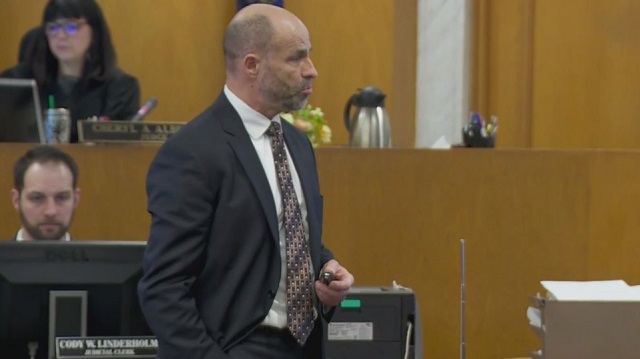
No matter how much Mr. Christian annoyed people, or how loud he was, he had a right to be on the MAX, Smith said. He also posed the question of whether Christian went too far. But he said a person is justified in defending himself with the degree of force he reasonably believes to be necessary.
Smith argued Christian didn’t know the motivations of Fletcher, Namkai-Meche and Best or whether they had weapons or martial arts training. It was three-against-one, Smith stressed.
When there’s a disparity of force, you’re allowed greater latitude in your response, he said.
The defense attorney also argued that, while the jury and spectators have the luxury of looking at the video over and over frame-by-frame, Christian did not have that benefit.
The defense plans to call an expert to explain how the brain functions under stress. Fight, flight or freeze. Nature makes us adapt to danger faster than conscious thought, Smith said.
According to the defense, their expert finds Christian has slow processing speeds, difficulty with visual organization, and tends to focus narrowly on detail rather than the big picture.
Christian also has a metal plate in his head, which the defense says he got after being shot by police while committing a crime at the age of 19. This, the defense says, makes him averse to engaging in “fisticuffs.”
“When the odds are against you, you defend yourself,” Smith said. “The only people who were injured were the three men who were attempting to throw Christian off the train. No one else was injured,” Smith said.
“This was not some wild killing spree generally on the MAX that day.”
Smith also argued that Christian was not the original aggressor. Namkai-Meche put the phone in his face and invaded his space and Fletcher told him to get off the train.
Christian’s lawyer reminded jurors that this can’t be a case of Monday morning quarterbacking. They have to look at the situation on the MAX train as Christian reasonably saw it, not as they can now with video and still images. Did he believe himself to be in danger?
The defense also brought up the free speech rally in the Montavilla neighborhood that Christian attended a few weeks before the MAX attack. The defense claims Christian received a death threat before that rally and, thus, had a heightened sense of danger the day of the attack.

The charges against Christian
On the eve of the trial, three weapons charges were dismissed. Christian pleaded not guilty to these 12 charges:
Two counts of first-degree murder, one count of first-degree attempted murder, one count of first-degree assault, one count of second-degree assault, three counts of second-degree intimidation, two counts of unlawful use of a weapon and two counts of menacing.
Court documents show the deadly rampage began with Christian yelling anti-Muslim slurs at a young woman wearing a hijab.
The trial is expected to last at least four weeks.
KOIN 6 News will be in the courtroom
and will provide updates each day throughout the trial.
